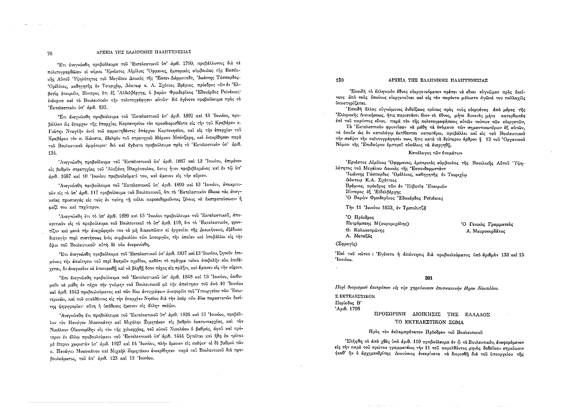
Baron Friedrich Eduard von Rheineck (1796-1854). Painting by Georgios Roilos, National History Museum, Athens
Baron Friedrich Eduard von Rheineck was born on November 2, 1796 in Potsdam, Prussia. He took part in the Napoleonic Wars against Napoleon as an officer of the Prussian Cavalry.
From the beginning of the Greek war of Independence of 1821, he expressed his interest in the liberation struggle of the Greeks and participated enthusiastically in the Philhellenic committees founded in Germany. He soon decided to go to Greece and fight as a volunteer.
In 1822, the Philhellenic Committee of Koblenz commissioned him to travel to Greece and to transfer significant financial aid that the Philhellenes of Koblenz had raised to support the Greek Revolution. He arrived in Corinth and soon assumed the duties of aid de camp of Alexandros Mavrokordatos in Messolonghi. In fact, he actively participated in the defence of Messolonghi, during the first siege of 1822[1] , where he distinguished himself.
During his service in Greece, von Rheineck was honoured for his bravery and in 1822 he received the rank of major; then in 1826 he was promoted to the rank of colonel of the Greek Army.
The Greek Administration granted to him, as well as to other prominent Philhellenes, the Greek citizenship, as early as in June 1823 [2].

The resolution granting Greek citizenship to von Rheineck and other prominent Philhellenes
Baron von Rheineck took part in important military operations throughout the Greek war for independence. In 1825 – 1827 he served in Nafplio[3]. In 1828 he took office in Aegina. Then, in the same year, he was sent by I. Kapodistrias with a unit of the Greek armed forces, to Gramvousa in Crete; he stayed there until the beginning of 1829. Among others he led the operations of the Greek forces until 1829, he contributed to the fight against piracy and he assured the safe passage of Cretans to the Peloponnese. [4]. After the death of I. Kapodistrias, von Rheineck, who at that time had the rank of colonel, was assigned in April 1832 commander of the Military School. In 1834, the School took its final form and was renamed the Military School of Cadets. [5] . Von Rheineck remained in this position until 1840.
Then, he served as a military commander of Nafplio in 1843.[6].In February 1840, meanwhile, he was promoted to brigadier general and appointed to the Court of Appeals, where he served as President in 1849.
He died on October 26, 1854 in Athens, while he was the president of the Appeal Court Martial, holding the rank of lieutenant general of the Greek Army. A few months before his death, Dimitrios Kallergis, his former comrade in arms, and minister of Defence in the government of Mavrokordatos, promoted him to honorary general.[7].
The tomb with the coat of arms of his family is located in the First Cemetery of Athens.[8].
Baron Frederick Edward von Rheineck was honoured for his contribution with the Grand Cross of the Order of the Knights of the Redeemer and the Silver Medal of Excellence of the Struggle.[9].
He had five children from his marriage with the sister of Alexandros Mavrokordatos, Efrosini Mavrokordatou.[10] His daughter, Wilhelmine Rheineck, was appointed in January 1851 Lady of Honour to Queen Amalia. She remained in this position for three years and then left to marry Aristides Valtatzis, a banker from Istanbul.[11]. Moreover, his son Aristides Rheineck (1834-1913), became a lieutenant General of the Greek Royal Navy.
Aristides Rheineck, participated in the Greek-Turkish war of 1897. In January 1897, he took command of the newly built battleship “Hydra” and a battleship squadron in which the warships “Mykali” and “Pinios” also participated. Aristides Rheineck saved the archives of Captain Leonidas Palaskas, and donated them to the Ministry of the Navy.[12].
Baron von Rheineck was a great Philhellene, with an important and multi-layered contribution, who naturalized Greek. His family participated in all the liberation struggles of Greece. SHP honours this great Philhellene.
References
[1] Περιοδικό ‘’Εβδομάς’’, Αθήνα, Έτος Α’(1884), τόμος Α’ αρ. 1. (χωρίς ημερ.) ως και αρ. 27, 2 Σεπτεμβρίου 1884, εκδ. Κορίννη ,Αθήνα, 1884, σελ.45.
[2]https://paligenesia.parliament.gr/page.php?id=654 . https://paligenesia.parliament.gr/page.php?id=5224
[3] Τράιμπερ, Ερρίκος, ‘’Αναμνήσεις από την Ελλάδα 1822-1828’’, επιμ. δρ. Χρήστος Ν. Αποστολίδης, ιδ. εκδ., Αθήνα, 1960, σελ. 75.
[4] Περιοδικό ‘’Εβδομάς’’, Αθήνα, Έτος Α’(1884), τόμος Α’ αρ. 1. (χωρίς ημερ.) ως και αρ. 27, 2 Σεπτεμβρίου 1884, εκδ. Κορίννη, Αθήνα, 1884, σελ.46. Επίσης, βλ. https://de.wikipedia.org/wiki/Agriolidis .
[5] Ιστοσελίδα της Στρατιωτικής Σχολής Ευελπίδων.
[6] Περιοδικό ‘’Εβδομάς’’, Αθήνα, Έτος Α’(1884), τόμος Α’ αρ. 1. (χωρίς ημερ.) ως και αρ. 27, 2 Σεπτεμβρίου 1884, εκδ. Κορίννη ,Αθήνα, 1884, σελ.46.
[7] Βλ. στο ίδιο.
[8] http://pandektis.ekt.gr/pandektis/handle/10442/163484
[9] Περιοδικό ‘’Εβδομάς’’, Αθήνα, Έτος Α’(1884), τόμος Α’ αρ. 1. (χωρίς ημερ.) ως και αρ. 27, 2 Σεπτεμβρίου 1884, εκδ. Κορίννη ,Αθήνα, 1884, σελ.46.
[10] Klenze, Leo von, ‘’ Aphoristische Bemerkungen gesammelt auf seiner Reise nach Griechenland’’, εκδ. G. Reimer, Βερολίνο, 1838, σελ. 156.
[11] https://archive.org/stream/amaliahvasiliss00alimgoog/amaliahvasiliss00alimgoog_djvu.txt
[12] Βικιπαιδεία. Επίσης, βλ. http://www.ghika.net/
Bibliography – Sources
- Περιοδικό ‘’Εβδομάς’’, Αθήνα, Έτος Α’ (1884), τόμος Α’ αρ. 1. (χωρίς ημερ.) ως και αρ. 27, 2 Σεπτεμβρίου 1884, εκδ. Κορίννη ,Αθήνα, 1884.
- https://paligenesia.parliament.gr/page.php?id=654
- https://paligenesia.parliament.gr/page.php?id=5224
- Τράιμπερ, Ερρίκος, ‘’Αναμνήσεις από την Ελλάδα 1822-1828’’, επιμ. δρ. Χρήστος Ν. Αποστολίδης, ιδ. εκδ., Αθήνα, 1960.
- https://de.wikipedia.org/wiki/Agriolidis
- Ιστοσελίδα της Στρατιωτικής Σχολής Ευελπίδων.
- http://pandektis.ekt.gr/pandektis/handle/10442/163484
- Klenze, Leo von, ‘’Aphoristische Bemerkungen gesammelt auf seiner Reise nach Griechenland’’, εκδ. G. Reimer, Βερολίνο, 1838.
- https://archive.org/stream/amaliahvasiliss00alimgoog/amaliahvasiliss00alimgoog_djvu.txt
- Βικιπαιδεία.
- http://www.ghika.net/

